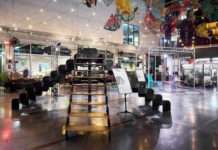Colonizing the Cerrado
José Antonio Gorgen, commonly known as Zezão, is one of the best-known soy growers in Matopiba, with huge farms spread across Maranhão and Piauí. He represents the views of many plantation owners and agriculturalists when he says the influx into Matopiba of southerners, of which he is one, was an extremely positive advance for the local population.
“If we hadn’t come from the south, this land would be empty today,” he tells Mongabay. He says there is just one large-scale soy grower in all of Maranhão who is originally from the state, while there are no native soy producers in Piauí state.
According to Zezão, the subsistence farming techniques practiced by traditional and indigenous communities are primitive, unproductive and backward. So their only hope for progress and a better way of life is to move to the city and be absorbed into the labor market.
“I’m going to tell you what one of my employees once told me,” he says. “‘With three months’ [worth] of my salary working for you, I can buy all of the beans and rice that my father and brothers produce.’ Where there’s soy, there’s more wealth, beautiful houses, new cars, supermarkets!”
Enemésio Ângelo Lazzaris, the bishop of Maranhão and a champion of the rights of native peoples, views this vision of “progress” quite differently: “Many people who lived in the countryside had to leave, move to the periphery of cities, causing the disintegration of [rural] communities,” he says. “Every year, land falls more and more into the hands of a few, and [indigenous and traditional] people are increasingly finding themselves without the land they need to sustain themselves and their family.”
Tasso Fragoso offers an interesting example in this regard. It is one of the biggest soy-producing cities in Matopiba, with soy plantations covering 1,560 square kilometers (602 square miles). It has the highest GDP per capita in Maranhão, and the 60th highest in Brazil (out of 5,560 municipalities). However, the human development indexes are comparatively very low for Tasso Fragoso, with poor water quality and sanitation, limited access to energy, and high levels of social vulnerability.
Analysts point to the unpalatable truths concealed within GDP statistics: subsistence farmers and traditional communities don’t contribute much to GDP, because their systems of production and consumption are local and not part of the wider economic market. But as soon as their land is co-opted by a large-scale soy grower, it is immediately brought into regional, national and international markets. A region’s GDP may therefore soar wildly upward, while the material wealth of most local inhabitants plummets, with land and money concentrated in the hands of a few.
“I ask, at the risk of being heretical to agribusiness: do you think it was worth it having all of these southerners come here?” Bishop Lazzaris says. “Wouldn’t it have been better to leave this land in the hands of Maranhenses [Maranhão natives]?”
Global responsibility
It’s easy to scapegoat industrial agribusiness for causing the Cerrado’s many social problems, but analysts point out that Brazilian entrepreneurs are only responding to global market demand. Customers buying chicken from some of Britain’s largest and best-known supermarkets and fast-food chains are helping fuel the social inequality half a world away.
Between Seu Raimundo de Miranda’s house in the city and his old plot of land in the country, at the edge of the soy fields, are huge processing plants belonging to Cargill and Bunge, transnational commodities traders. These companies, and others, including Archer Daniels Midland (ADM) and Brazil’s own Amaggi, buy up soy from large-scale landowners and export it around the globe, especially to the European Union and China.
In the U.K., McDonald’s, Tesco and Morrisons buy their chicken from Cargill, the biggest privately held company in the U.S., which maintains huge operations in the Cerrado. The U.K. is also the fifth-biggest importer of Cargill’s soy (cultivated in the Cerrado), after China, Thailand, the Netherlands and France, according to data collected by Trase.earth.
This story first appeared on Mongabay
South Africa Today – Environment
This article is licensed under a Creative Commons Attribution-NoDerivatives 4.0 International License.
You may republish this article, so long as you credit the authors and Mongabay, and do not change the text. Please include a link back to the original article.












